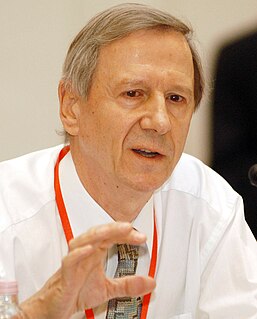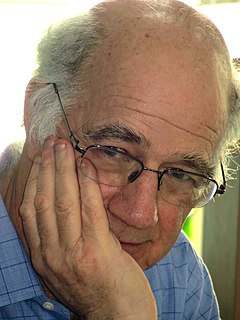Modernity, a topic in the humanities and social sciences, is both a historical period and the ensemble of particular socio-cultural norms, attitudes and practices that arose in the wake of the Renaissance—in the "Age of Reason" of 17th-century thought and the 18th-century "Enlightenment". Some commentators consider the era of modernity to have ended by 1930, with World War II in 1945, or the 1980s or 1990s; the following era is called postmodernity. The term "contemporary history" is also used to refer to the post-1945 timeframe, without assigning it to either the modern or postmodern era.

Anthony Giddens, Baron Giddens is an English sociologist who is known for his theory of structuration and his holistic view of modern societies. He is considered to be one of the most prominent modern sociologists and is the author of at least 34 books, published in at least 29 languages, issuing on average more than one book every year. In 2007, Giddens was listed as the fifth most-referenced author of books in the humanities. He has academic appointments in approximately twenty different universities throughout the world and has received numerous honorary degrees.

Zygmunt Bauman was a Polish sociologist and philosopher. He was driven out of the Polish People's Republic during the 1968 Polish political crisis and forced to give up his Polish citizenship. He emigrated to Israel; three years later he moved to the United Kingdom. He resided in England from 1971, where he studied at the London School of Economics and became Professor of Sociology at the University of Leeds, later Emeritus. Bauman was a social theorist, writing on issues as diverse as modernity and the Holocaust, postmodern consumerism and liquid modernity.

Florian Witold Znaniecki was a Polish philosopher and sociologist who taught and wrote in Poland and in the United States. Over the course of his work he shifted his focus from philosophy to sociology. He remains a major figure in the history of Polish and American sociology; the founder of Polish academic sociology, and of an entire school of thought in sociology. He won international renown as co-author, with William I. Thomas, of the study, The Polish Peasant in Europe and America (1918–1920), which is considered the foundation of modern empirical sociology. He also made major contributions to sociological theory, introducing terms such as humanistic coefficient and culturalism.

Sociology as a scholarly discipline emerged, primarily out of Enlightenment thought, as a positivist science of society shortly after the French Revolution. Its genesis owed to various key movements in the philosophy of science and the philosophy of knowledge, arising in reaction to such issues as modernity, capitalism, urbanization, rationalization, secularization, colonization and imperialism.
The concept of reflexive modernization or reflexive modernity was launched by a joint effort of three of the leading European sociologists: Anthony Giddens, Ulrich Beck and Scott Lash. The introduction of this concept served a double purpose: to reassess sociology as a science of the present, and to provide a counterbalance to the postmodernist paradigm offering a re-constructive view alongside deconstruction.
In sociology, the term rationalization was coined by Max Weber, a German sociologist, jurist, and economist. Rationalization is the replacement of traditions, values, and emotions as motivators for behaviour in society with concepts based on rationality and reason. The term rational is seen in the context of people, their expressions, and or their actions. This term can be applied to people who can perform speech or in general any action, in addition to the views of rationality within people it can be seen in the perspective of something such as a worldview or perspective (idea). An example of rationalization can be seen in the implementation of bureaucracies in government is a kind of rationalization, as is the construction of high-efficiency living spaces in architecture and urban planning. A potential reason as to why rationalization of a culture may take place in the modern era is the process of globalization. Countries are becoming increasingly interlinked, and with the rise of technology, it is easier for countries to influence each other through social networking, the media and politics. An example of rationalization in place would be the case of witch doctors in certain parts of Africa. Whilst many locals view them as an important part of their culture and traditions, development initiatives and aid workers have tried to rationalize the practice in order to educate the local people in modern medicine and practice.
Late modernity is the characterization of today's highly developed global societies as the continuation of modernity rather than as an element of the succeeding era known as postmodernity, or the postmodern. Introduced as "liquid" modernity by the Polish sociologist Zygmunt Bauman, late modernity is marked by the global capitalist economies with their increasing privatization of services and by the information revolution.

Michael Burawoy is a sociologist working within Marxist social theory, best known as the leading proponent of public sociology and the author of Manufacturing Consent: Changes in the Labor Process Under Monopoly Capitalism—a study on the sociology of industry that has been translated into a number of languages.

The Culture of the New Capitalism is a 2006 book written by Richard Sennett about the economic situation of the time. In the book, Sennett covers politics, economics, sociology and psychology.

Monika Maria Kostera is a Polish sociologist. She is known for her contribution to organization theory, organizational archetypes and myths, storytelling and narrative analysis in organizational anthropology. She holds professorships at University of Warsaw, Södertörn University in Sweden and Institut Mines-Télécom Business School in France.
The following events related to sociology occurred in the 2000s.
The following events related to sociology occurred in the 1980s.

Leonidas Donskis was a Lithuanian-Jewish philosopher, political theorist, historian of ideas, social analyst, and political commentator, professor of politics and head of "VDU Academia Cum Laude" at Vytautas Magnus University, Honorary Consul of Finland in Kaunas and deputy chairman of the Lithuanian Jewish Community. He was also the member of the European Parliament (MEP) from 2009 to 2014.

David Lyon is a retired Scottish sociologist who directed the Surveillance Studies Centre at Queen's University in Kingston, Ontario. He previously held a Queen’s Research Chair position and appointments in the Department of Sociology and the Faculty of Law at Queen's University.
"The Stranger" is an essay by Georg Simmel, originally written as an excursus to a chapter dealing with the sociology of space in his book Soziologie. In this essay, Simmel introduced the notion of "the stranger" as a unique sociological category. He differentiates the stranger both from the "outsider" who has no specific relation to a group and from the "wanderer" who comes today and leaves tomorrow. The stranger, he says, comes today and stays tomorrow. The stranger is a member of the group in which he lives and participates and yet remains distant from other – "native" – members of the group. In comparison to other forms of social distance and difference the distance of the stranger has to do with his "origins". The stranger is perceived as extraneous to the group and even though he is in constant relation to other group members; his "distance" is more emphasized than his "nearness". As one subsequent interpreter of the concept put it, the stranger is perceived as being in the group but not of the group.
The Polish Sociological Review is a quarterly peer-reviewed academic journal published by the Polish Sociological Association. It covers diverse areas of sociology, especially social theory, social structure, social change, culture and politics in global perspective. The journal publishes articles in English. Published by Polish Sociological Association.
Michael Hviid Jacobsen is a Danish professor of sociology. Since 1997 he has been employed at Aalborg University, acting from 2009 as a professor at the Department of Sociology and Social Work. He is a frequent lecturer and often appears in the media as an expert within a wide range of topics, particularly in relation to our changing culture of death and criminal issues.
The Generation: The Rise and Fall of the Jewish Communists of Poland is a 1991 book about the intersection of communism in Poland and Polish Jewry. Its primary focus are the Polish Jews of the generation born in the early 1900s, many of whom embraced the communist ideology.
Izabela Wagner-Saffray is a Polish born European sociologist. Wagner has been an Associate Professor at the Institute of Sociology at Collegium Civitas in Warsaw since December 2019. She is also a Fellow at ICM in Paris since 2019. Her sociological research is concerned with violin virtuosos. Wagner's contributions are focused on the careers of artists and intellectuals, professional socialization and geographic mobility, migrations and forced-migrations.









